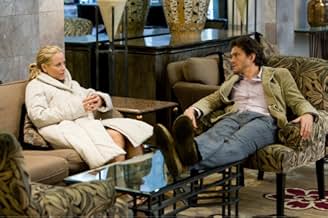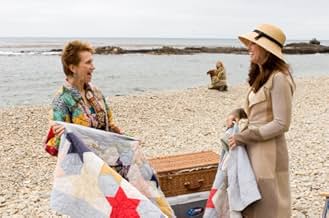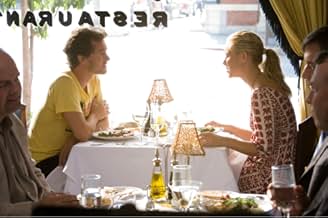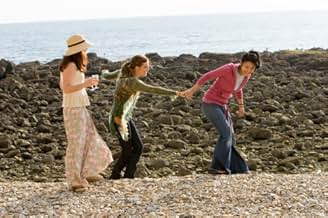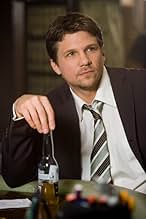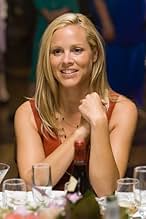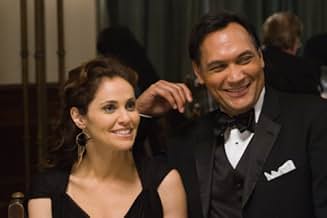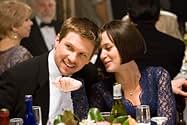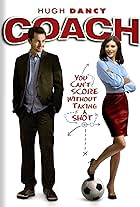Aggiungi una trama nella tua linguaSix Californians start a club to discuss the works of Jane Austen, only to find their relationships -- both old and new -- begin to resemble 21st century versions of her novels.Six Californians start a club to discuss the works of Jane Austen, only to find their relationships -- both old and new -- begin to resemble 21st century versions of her novels.Six Californians start a club to discuss the works of Jane Austen, only to find their relationships -- both old and new -- begin to resemble 21st century versions of her novels.
- Premi
- 2 candidature totali
Recensioni in evidenza
The premise of the film is simple but irresistible. Six Californians decide to get together once a month to discuss each one of Austen's six novels in turn. The group has some cohesiveness--most of the people are friends, and the group includes a mother and her daughter. However, there is a newcomer--a young man--who is not familiar with Austen, but is charming enough, and eager enough, to be accepted because the group lacks a sixth member.
All of the women are in a lesser or greater crisis at some point in the movie, and the film intertwines their problems with the problems faced by Austen's heroines. The parallel is apt enough--the women, like Austen's heroines, are attractive and reasonably comfortable financially. Most of their problems center around love, or lack of love, which, again, follows Austen's plots.
There's a problem with the movie--every one of the main characters is extremely attractive. Surely, there must be some average-appearing women and men in the Sacramento area. One of the actors--Emily Blunt-- is so beautiful that it's hard to believe she's real. It's also hard to believe that she would have married--and would stay with--her insensitive lout of a husband. (I've never seen Blunt in a film before. When I checked her images in Google, she just looked like one more very attractive young actor. In this movie, she's other-worldly.) I would have liked the movie more if some of the characters had the appearance of people you meet in the real world.
The film will work better if you know Jane Austen's novels and characters. However, even if you don't, "The Jane Austen Book Club" is still worth seeing. Incidentally, it's not a chick-flick. I don't see why men would like the movie any less then women. It's a good film for anyone who likes to read and likes to think.
The characters and resolution didn't convince or engage me, though. I just did not believe, at any point, that these were real people. I especially did not believe the final scene. "He ended up with her? I don't think so," was what I kept thinking. I didn't believe the final couplings, and I did not care.
I had the same problem with this movie that I had with the book on which it was based. Both book and movie felt like writerly exercises to me. I felt as if the writer, Karen Joy Fowler, got this neato schematic idea in her writing class, "Aha! A book club of bourgeois people who read Jane Austen and fall in love!" and went about filling in the pieces of that puzzle without ever investing any of the characters with real human warmth.
One characterization stands out, though. Emily Blunt as a depressive woman with a bad mother, a mediocre marriage, and a temptation to do very bad things, creates a moody air all by herself. It's as if she came in from the set of a daring indy movie. I hope she's given chances in the future to live up to the promise she shows here.
But it is a movie that with primary appeal to two groups--chicks and Jane Austen devotees, including the male ones. Are there enough of these to make a movie a success? Yes, there are.
Jane Austen's work stays current because she wrote about timeless themes--how do you choose the best person to marry? Is love enough, or even required for lifelong contentment? How do you deal with difficult or embarrassing family members? How best to handle a family crisis? How do you learn to tell true friends and quality persons from those who are perhaps flashy and amusing, but will end up betraying your friendship and trust or, heaven forfend, tempting you to abandon your own principles? Whether you live in the age of Blackberries and Hybrid SUV's, or the age of sealing wax and barouches, every person comes smack up against many or most of these vexing problems throughout their lives.
The conceit of this movie and the book it is based upon is that a shared love and appreciation of the works of Jane Austen can provide the currency through the exchange of which modern women (and a few selected men) can confront, share, and come to better understand their personal challenges and in the process, form bonds of friendship or even romance. The strength of this movie is that even if you have a tough time with that conceit, you will still enjoy the humor of it, and the strong performances. It's pleasant to watch, like curling up with a favorite book and a frothy cup of chocolate. It is true to Janeno explosions, the villains aren't completely evil, the primary problems of the characters stem from incomplete or willfully-faulty understanding of themselves and those around them, there is no melodrama or Gothic touches except of the parody sort, and the lone death happens off screen.
I have this weird little theory about why P&P is the MOST beloved of all of Austen's books. Sure, Darcy is a smoldering hunk of tightly-controlled passion and Lizzie is as spirited and intelligent a heroine as ever nanced through a foot of mud to get to the bedside of an ailing sister, but that's not it.
In all the other Austen pairings, you had a sense that they were pairings which would truly happen in real life because deep down we know nothing has really changed from Austen's day--women's beauty and youth and social standing is factored into a certain equation which determines how handsome, wealthy, charming, accomplished, or respected a man she is able to aspire to. In no case, other than P&P, does this basic equation get violated. Lady Catherine De Bourg had it right. A shocking match, indeed! The Lizzie/Darcy romance, therefore, is the lone Cinderella story, and don't give me Edmund and Fanny, as Edmund was a younger son most in need of a virtuous wife who wouldn't ever embarrass him and was never laid out as a man of wildly attractive appearance while virtuous Fanny's looks were improved enough to attract the flirtatious Henry Crawford.
So, we women, all of us, are madly in love with P&P precisely because it is the ultimate fantasy of this amazing guy who will love us JUST FOR OUR QUICK WIT, GOOD HEART, and FINE EYES. There are no Mr. Darcy's, just like there are no characters of the sort commonly played by John Cusack, so get over it, already. There is possibly a Mr. Rochester, but remember, he had a crazy wife locked in the attic, a creepy housekeeper, an insipid ward, a bit of a sarcastic streak, and was once played on screen by a pudgy Orson Wells. In other words, a lot of baggage. And he still wasn't able to be brought up to scratch by Plain Jane Eyre until his fine big house had been burned down, his eyes put out, and his arm messed up. Now THAT is reality.
It is true in real life that single dog breeders can, and do, meet nice men and fall in love and maybe even get married. It is also true that nice, handsome, heterosexual men join book clubs*.
But this movie serves up impossibly cute Hugh Dancy in the role of an implausibly unattached, adorably geeky Grigg Harris who loves reading, older women, and can dance gracefully despite being too clumsy to artfully sip a cocktail. The statistical probability of such an attractive and unspoiled man (one who admits he is willing to be "directed") like this joining your book club and then actually wanting to develop a romantic relationship with an unattached woman older than himself is approximately the same as seeing one of the Dragonriders of Pern barnstorming over an Iowa cornfield.
In the RL JABC, Grigg would be gay and Allegra would be straight and Bernadette would be queuing up for the Early Bird Special at Cracker Barrel. And your cheating ex-spouse, Jimmy Smits, ain't never coming back, and if he did, it would be after a series of weepy drunken whiny pathetic phone calls at 3am. There will be no "letter". This movie is a little bit cruel to imply otherwise.
But that's OK. The world would be a very unkind place without at least the notion of dragons and rocketships, Darcys and Griggs. And that is why we loved it.
*with wife.
And yet I loved this movie.
I loved the nerdiness, I loved the intimacy, I loved watching it unfold exactly as you know it's going to. And the chemistry between Hugh Dancy and the gorgeous Maria Bello crackles off the screen.
I know, I know, you could level this movie without much effort. You wouldn't even need that big of a stick. But you find yourself not caring.
This film is pure pleasure, start to finish. I gladly relinquish one of my Man cards for saying that. I'm off to watch something with guns in to compensate, though.
While it is not particularly realistic, the characters are interesting and likable, the acting is good, and it is not filled with violence and vulgarity, something that seems to be hard to find in the movie theater right now.
All the actors are good but Emily Blunt really stands out. She could end up being a big star. And who knew that Maggie Grace was a real actress and not just the bimbo she played on "Lost."
"The Jane Austen Fan Club" is not a masterpiece and you can probably wait for it to show up on video, but with the poor variety currently available in the theaters, it is the best thing out right now.
Trama
Lo sapevi?
- QuizAlthough they play teacher and student, Emily Blunt is only a year older than Kevin Zegers.
- BlooperWhen Allegra is separating eggs for the flan, she puts the first couple of yolks in the bowl with the whites, defeating the purpose of separating them. She is then seen taking the yolks out with the egg shell as she does this. (The actors had a limited number of takes available and Maggie Grace was forced to do this so she would not waste a take.)
- Citazioni
Grigg Harris: What about me? Am I your friend? Or am I just some... some widget to help you make Sylvia feel better about herself? Why did you invite me to be part of your book club? No, what went through your mind the first time you saw me? "There's a man who is *dying* to read every book Jane Austen ever wrote." Is that what you thought?
Jocelyn: No.
Grigg Harris: But I thought, "What a beautiful woman. I hope she looks over at me." I thought if I read your favorite books that you would read mine. But no... no, no. You just want to be obeyed. That's why you have dogs.
- Curiosità sui creditiThe credits are displayed next to behind-the-scenes stills of the cast and crew during the production process.
- Colonne sonoreNew Shoes
Written by Paolo Nutini, James Duguid and Mathew Benbrook
Performed by Paolo Nutini
Courtesy of Warner Music U.K. Ltd.
By Arrangement with Warner Music Group Film & TV Licensing
I più visti
Dettagli
- Data di uscita
- Paese di origine
- Sito ufficiale
- Lingua
- Celebre anche come
- The Jane Austen Book Club
- Luoghi delle riprese
- La Traviata, 301 Cedar N. Ave, Long Beach, California, Stati Uniti(Grigg and Sylvia having dinner)
- Aziende produttrici
- Vedi altri crediti dell’azienda su IMDbPro
Botteghino
- Lordo Stati Uniti e Canada
- 3.575.227 USD
- Fine settimana di apertura Stati Uniti e Canada
- 148.549 USD
- 23 set 2007
- Lordo in tutto il mondo
- 7.163.566 USD
- Tempo di esecuzione1 ora 46 minuti
- Colore
- Mix di suoni
- Proporzioni
- 1.85 : 1
Contribuisci a questa pagina



